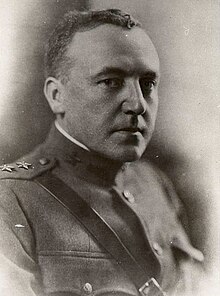Fox Conner
| Fox Conner | |
|---|---|

Major General Fox Conner
|
|
| Born |
November 2, 1874 Slate Springs, Mississippi |
| Died | October 13, 1951 (aged 76) Washington, D.C |
| Allegiance |
|
| Service/branch |
|
| Years of service | 1898–1938 |
| Rank |
|
| Commands held | 20th Infantry Brigade 1st Infantry Division Hawaiian Department First Corps Area First United States Army |
| Battles/wars |
Spanish–American War Pancho Villa Expedition World War I |
| Awards |
Distinguished Service Medal Purple Heart Spanish War Service Medal Army of Cuban Occupation Medal Victory Medal Companion of the Order of the Bath Commander of the French Legion of Honor Commander of the Belgian Order of the Crown Croix de guerre 1914–1918 (France) |
Fox Conner (November 2, 1874 – October 13, 1951) was a major general of the United States Army. He served as operations officer for the American Expeditionary Force during World War I, and is best remembered as a mentor to the generation of officers who led the Army in World War II, particularly as "the man who made Eisenhower".
Conner was born at Slate Springs, in Calhoun County, Mississippi.
He was appointed to the United States Military Academy in 1894, graduated as a Second Lieutenant in the Class of 1898, and was assigned to the 1st Artillery Regiment. The Army denied his several requests for transfer to the Cavalry.
His first posting was to Fort Adams in Newport, Rhode Island. After brief assignments in Huntsville, Alabama and Savannah, Georgia he was sent to Cuba in January 1899 to serve with the U.S. occupation force following the Spanish–American War.
In September 1907 Conner was assigned to the Army's General Staff and also as a student at the Army War College from which he graduated in July 1911. He was then attached to the French 22nd Field Artillery Regiment in Versailles, France from October 1911 to October 1912.
Following his return to the United States Conner commanded Artillery batteries in the Western states and on the Mexican border. In July 1916 Conner was promoted to Major and assigned to the Inspector General's office in Washington. He was in this position when the United States declared war on Germany in April 1917.
...
Wikipedia
